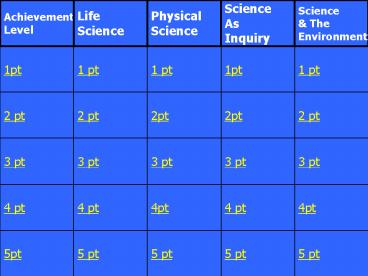Blank Jeopardy - PowerPoint PPT Presentation
1 / 51
Title:
Blank Jeopardy
Description:
Title: Blank Jeopardy Author: Eleanor M. Savko Last modified by: TPSS Created Date: 8/19/1998 5:45:48 PM Document presentation format: On-screen Show (4:3) – PowerPoint PPT presentation
Number of Views:126
Avg rating:3.0/5.0
Title: Blank Jeopardy
1
Achievement Level
Life Science
Physical Science
Science As Inquiry
Science The Environment
1 pt
1 pt
1pt
1 pt
1pt
2 pt
2 pt
2pt
2pt
2 pt
3 pt
3 pt
3 pt
3 pt
3 pt
4 pt
4 pt
4pt
4 pt
4pt
5pt
5 pt
5 pt
5 pt
5 pt
2
A student at this level has not demonstrated the
fundamental knowledge and skills needed for the
next level of schooling.
3
What is a Unsatisfactory?
4
A student at this level has only partially
demonstrated the fundamental knowledge and skills
needed for the next level of schooling.
5
What is Approaching Basic?
6
A student at this level has demonstrated only the
fundamental knowledge and skills needed for the
next level of schooling.
7
What is basic?
8
A student at this level has demonstrated
competency over challenging subject matter and is
well prepared for the next level of schooling.
9
What is Mastery?
10
A student at this level has demonstrated
superior performance beyond the level of mastery.
11
What is Advanced?
12
Organisms in this Kingdom have characteristics of
both plants and animals.
13
What is Kingdom Protista?
14
These are the three main ingredients of
photosynthesis.
15
What are CO2, water, sunlight?
16
These are the two types of cells.
17
What are Prokaryotes Eukaryotes?
18
While plants algae are able to make there own
food, all organism must complete this process to
free the energy in the food in order to survive.
19
What is cellular respiration?
20
Oxygen and carbon dioxide molecules pass freely
through cell membranes. This factor determines
the direction most molecules will pass through
the cell Membrane.
21
What is the concentration of the gas molecules on
each side of the membrane? A.K.A. Concentration
Gradient
22
The element that will gain only one electron
during a chemical reaction.
23
What is Chlorine?
24
The rate at which an object changes its position.
25
What is a velocity?
26
p mv
27
What is a momentum mass x velocity?
28
Calcium, strontium, and barium are commonly
called this kind of element.
29
What is alkaline?
30
When an airplanes ailerons move in opposite
directions they usually cause a plane to do this.
31
What is roll?
32
Two students set up identical lab experiments to
determine the effects of heat on photosynthesis
rates. One student only has plants that receive
the treatment, while the other includes this to
ensure the results are reliable.
33
What is the control?
34
The educated guess that a scientist creates based
on observations and research about the natural
world.
35
What is an hypothesis?
36
Goggles, apron, close-toed shoes, hair pulled
back, avoid food drink, walk, nor horse-play.
37
What are lab safety precautions?
38
The hypothesis for the following Yellow dust
accumulates on the ground and other materials,
oak trees do not have leaves, but do have long
bumpy structures that release the dust when the
wind blows.
39
What is a prediction that the oak trees are
entering the early stages of reproduction which
is pollen exchange?
40
White light consists of wavelengths of all
colors. The shorter wavelengths appear blue, and
the longer wavelengths appear red. Blue light is
scattered more easily by Earths atmosphere than
red light. That is why the sky appears blue
during most of the day. This is why at sunset the
sky appears red.
41
What is the angle of the setting sun causes
sunlight to travel a greater distance through the
atmosphere, thus causing blue light to scatter
before it reaches the observer?
42
The part of the world where all life exists.
43
What is the biosphere?
44
Minerals and fossil fuels are classified as this
type of resource because it takes so long for
them to be made.
45
What are Non-renewable Resources?
46
Scientist who studies volcanoes.
47
What is a Volcanologist?
48
Lithospheric plates move constantly causing three
types of geological events from the plate
movement.
49
What are earthquakes, volcanic eruptions, and
mountain building?
50
About 14 elements make up the Earths crust.
Silicon is 28 another important element
comprises 47. This element can be generated
from mercuric oxide and is responsible for nearly
50 of the weight of the earths crust.
51
What is oxygen?































